Autism and the Holidays
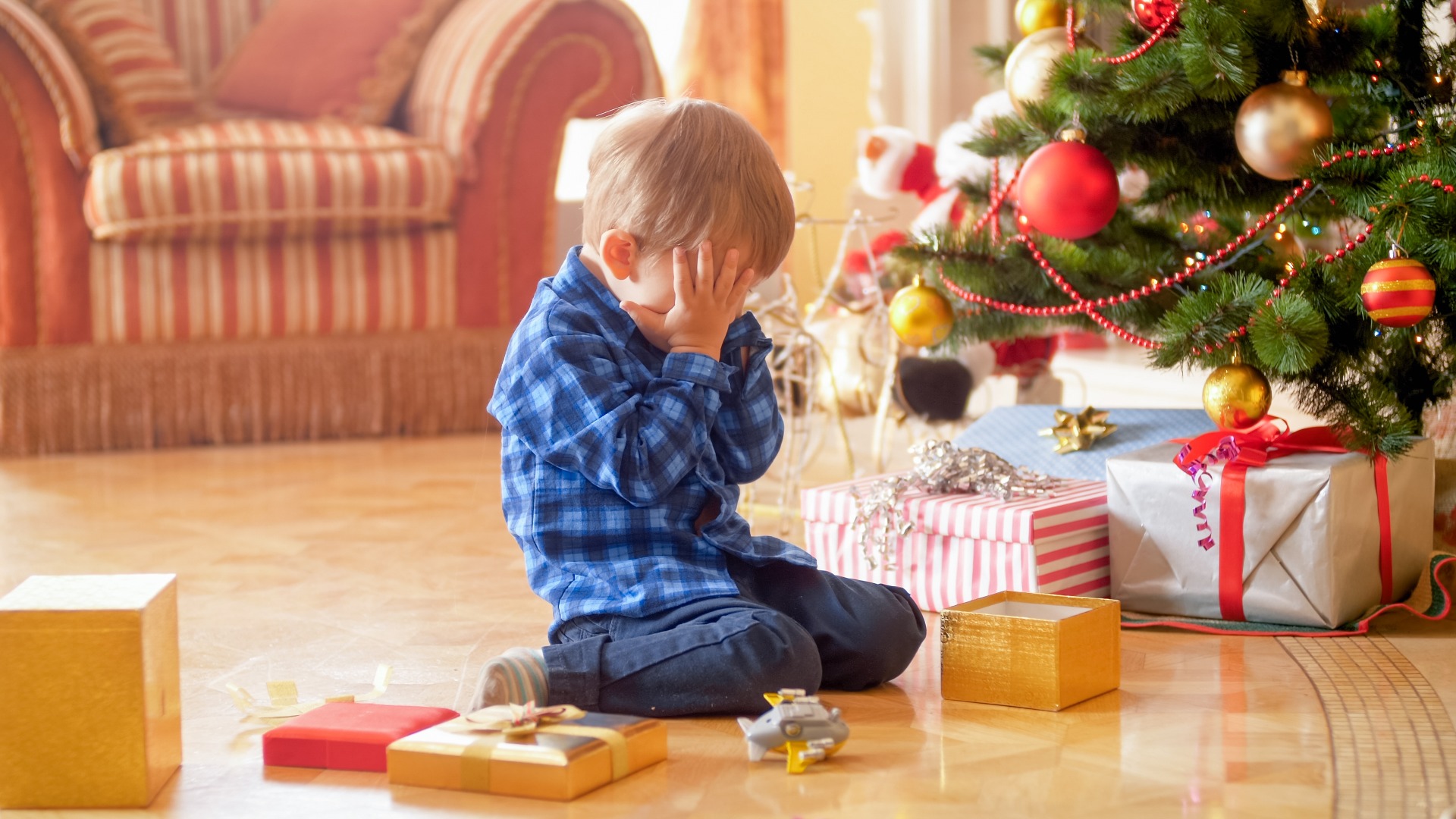
For children with autism, the holidays aren’t always a time of joy. Instead, the many changes that Christmas brings can lead to stress.
Bright lights, loud crowds and carolers, holiday foods, sitting on a stranger’s (AKA Santa’s) knee, extended family expecting hugs and kisses, the increase in social interactions, the anticipation of waiting for and counting down to Christmas, going from house to house for holiday parties, and the change in routine are just some of the reasons December can create tension and sensory overload for your child.
But there are steps you can take to make the holidays easier on your child and more joyous for your family. These suggestions might not work for every child with autism. You know your child best, try some of these ideas to see what works for your family.
Browse our suggestions by topic:
Holiday Expectations
Decorations
Holiday Themed Activities
Visiting Santa
Holiday Parties
Alternative Activities
Asking for Help
Balancing the Needs of Your Other Children
Christmas Gifts
Purchasing Gifts with Your Child
Choosing Gifts for Your Child
Wrapping Gifts
Unwrapping Gifts
Holiday Travel
Prepare Your Child
Contact the Airport and Hotel
Plan Ahead and Pack Essentials
Visiting Relatives
Preparing Your Child
Preparing Your Relatives
Helping Your Child Cope
Tips for Christmas Eve and Christmas Morning
Mealtime
Opening Presents
Looking Toward the Future
Christmas With AutismDecember begins with twinkling Christmas lights But for children with autism that’s not what they feel No more routine, it’s winter break Help relieve my stress before the holiday’s end |
Holiday Expectations

Many parents have expectations for Christmas: bright-eyed excited children, a picture-perfect house, a large holiday meal with family... But these expectations are unrealistic for any family, including those with a child who has autism. Your children may fight over toys, fuss about the food, or have a meltdown. It’s important to recognize that the holidays aren’t about being perfect. They’re about cherishing time with family and friends.
Parents of children with autism often have to deal with feelings of sadness, disappointment, and loneliness during the holidays. It can be hard to watch other children, even siblings, enjoy the season in ways that your child just can’t. Perhaps you’ve dreamed of taking your child to see the Nutcracker, but can’t due to your child’s sensitivities. Or maybe they aren’t as interested in opening presents as their siblings.
While this can be a difficult time of year, remember that Christmas is about seeing your children happy, even if that means changing or scaling back traditions. Focus on celebrating in a way that will bring joy to your whole family. Don’t feel bad about sticking only to the traditions that make you happy or have special meaning (you don’t need to send out holiday cards if it stresses you out).
And make sure you help set your child’s expectations too. A simple calendar marking for when winter break begins, or when you will decorate, or when it will be Christmas, etc. can help children who function best with a routine by letting them know what will happen and when. You could also add when things will return to normal (when decorations will be taken down, when school will resume, etc.).
Be proactive and flexible, so your family can have a happy holiday.
Decorations
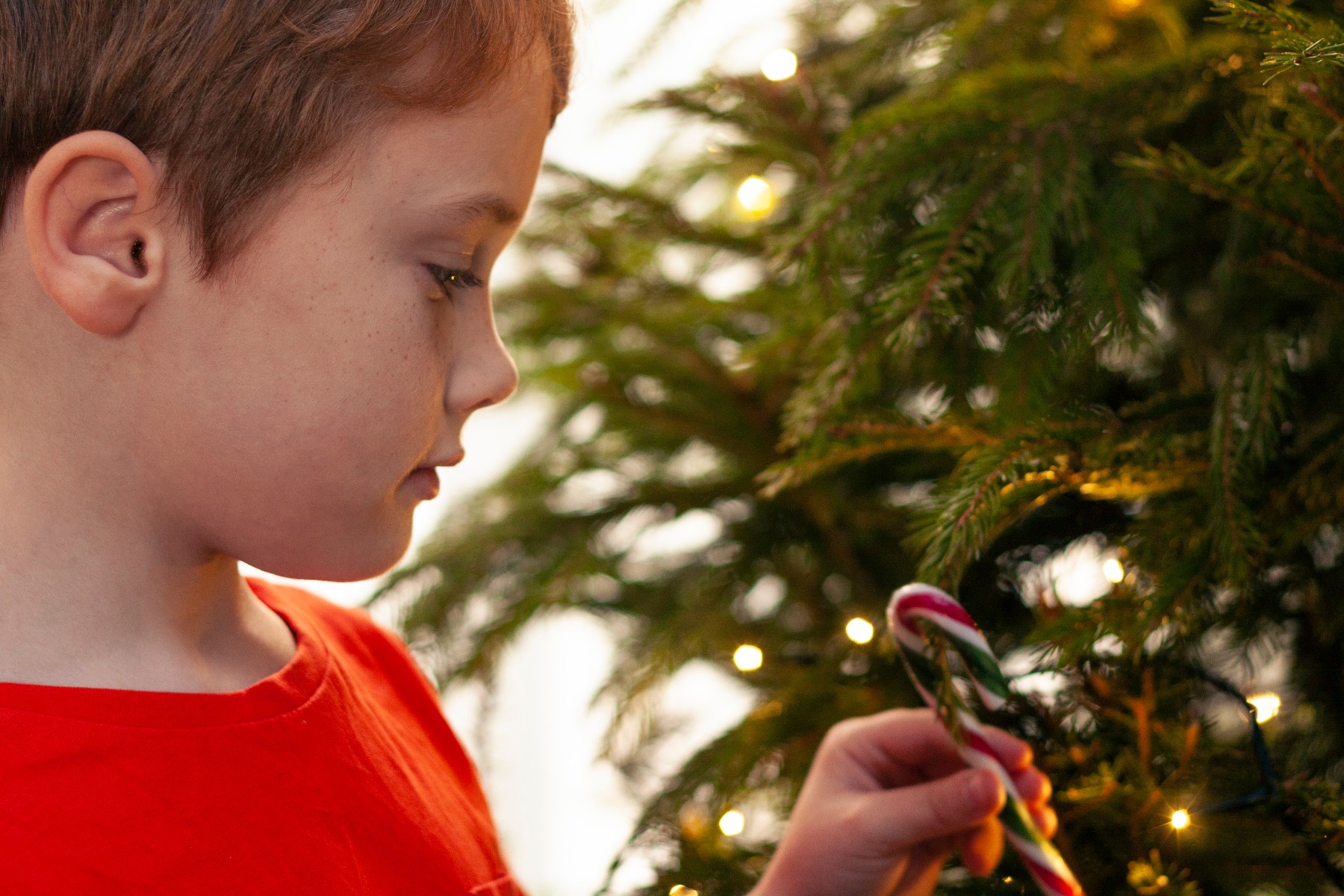
Lights, trees, ornaments, wreaths, candles, presents, nativities, Santa, Elf on the Shelf, reindeer, stuffed snowmen, and other decorations often fill houses during the holidays. All of these holiday decorations can be a sensory overload for your child or they may enjoy the sensory stimulation. You know what your child will enjoy and when the new look might become visually overwhelming which could trigger a meltdown. Just remember that your child won’t have a higher threshold than usual just because it’s the holiday season.
Explaining why you’re decorating and letting your child help might make the decor changes easier for your child. Overtime it can even become part of the Christmas routine that your child expects and enjoys.
If you have other children, and want to bring in the holiday spirit without overdoing it, consider limiting the decorations downstairs to help your child with autism cope and letting those kiddos add extra decorations to their rooms instead.
Holiday Themed Activities
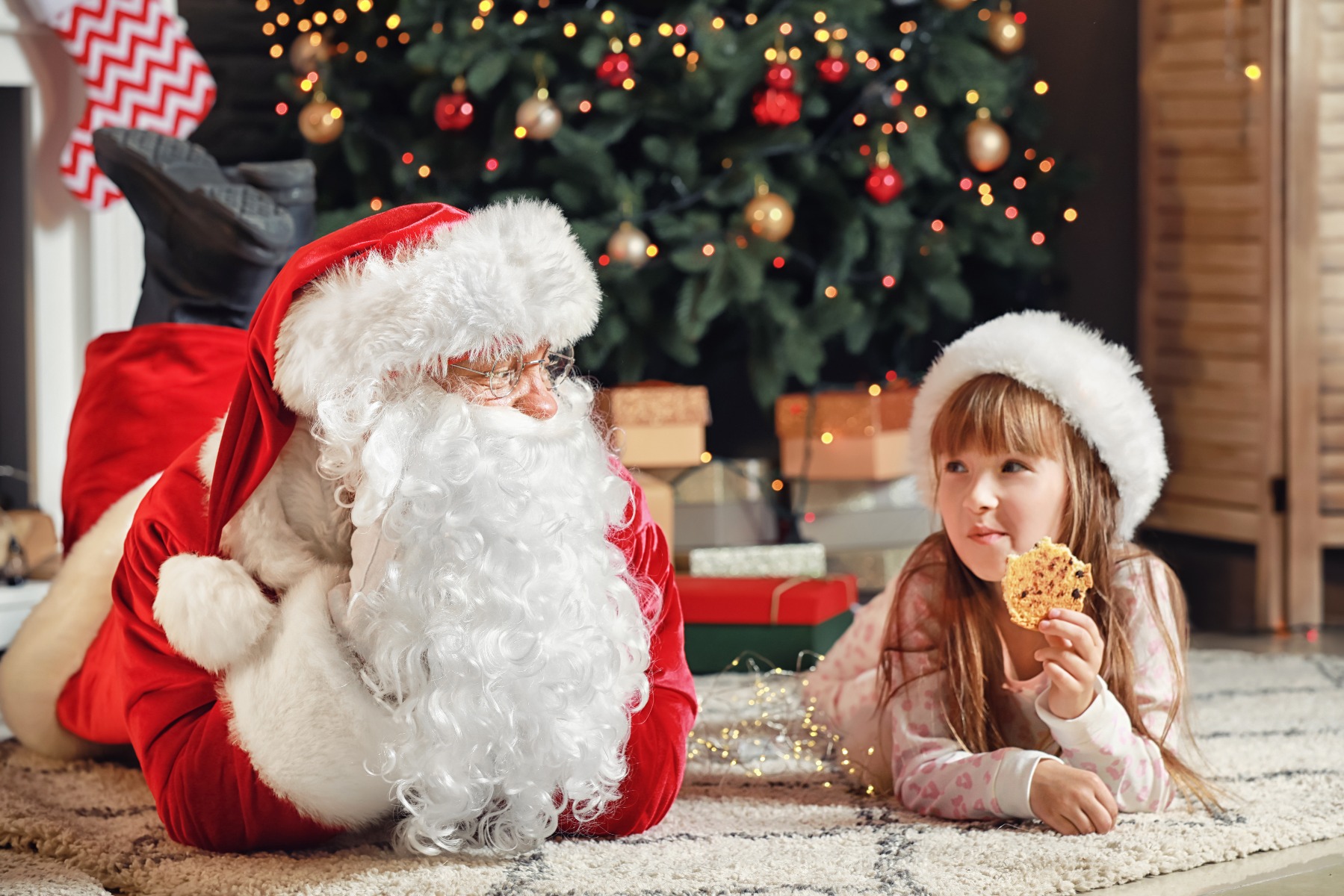
Holiday activities like visiting Santa or going to church on Christmas Eve can be difficult for children with autism. To make it easier for your family, plan everything in advance. Try to stick to your child’s daily schedule as much as possible and add holiday activities to it.
Visiting Santa
The lights and music and people in costumes may make going to see Santa at the mall overstimulating for your child. Look to see if your shopping center offers a time for children with disabilities. They may dim the lights, lower the music, and let you book a time slot to reduce wait times. If your mall doesn’t offer this, reach out and see if they would be willing to try it or to schedule you in (perhaps at the beginning or end of the day) so your child doesn’t have to wait in line.
When you go to visit Santa, prepare your child in advance. Let them know what the place will look and sound like, sharing pictures of previous years if possible. Consider rehearsing common questions and answers, like “What’s your name?” “What do you want Santa to bring you for Christmas?”. If your child uses a speech device, consider adding what they would like, so they can answer Santa and other people who will be asking them over the holidays. When you get there, let the elves know if you need any other accommodations.
If your child isn’t ready to go out to visit Santa, you could also have him come to you. The familiar environment can make this tradition easier for your child. Be sure to prepare them for the visit to help increase your chances of a positive experience.
Holiday Parties
It’s okay to be selective about the parties you decide to go to. You don’t need to attend every event, especially those that have rigid expectations like fancy clothing and quiet voices. Seek out places that are accepting and welcoming. Give your child time to acclimate when you arrive and give your child a space they can retreat to if the party becomes overwhelming.
Alternative Activities
While some holiday activities can be overwhelming, consider alternatives that let all of your children enjoy the fun but reduce the stress level for your child with autism.
| Instead of... | Try... |
|---|---|
| Parades and full town light celebrations | Driving in your car to see local light displays |
| Going to see Christmas window displays or museums at peak hours | Looking at the window displays when the store is closed or heading to the museums first thing to miss the crowds |
| Going to see Santa at the mall | Inviting Santa to your home |
| Trying to hit every holiday party | Being selective about the parties you attend and staying home to bake cookies, cut paper snowflakes, or enjoy other holiday activities instead |
| Attending a professional musical/dance performance like the Nutcracker or a Christmas Carol | Seeing a small, local production, shorter, less expensive performances, musicals geared toward children, or other events that you can leave if necessary knowing your child got a taste of the holiday activity |
| Long shopping trips to buy for everyone on your list | A short trip for your child to pick just one or two gifts for a family member |
| A long, full day of family togetherness on Christmas Eve/Day | Stopping in for a few hours depending on what your child can handle |
| Sitting in the front or middle pews of a church service | Sitting towards the back so you can retreat early if the service is too long for your child |
| Holiday activities with crowds and overwhelming sensory experiences | Looking into local “sensory friendly” activities that your town offers |
Asking for Help
If you really need or want to go to a special party, a church service, or out caroling, ask for support. There’s nothing wrong with asking for respite care from friends or family so you can recharge and enjoy an activity you love.
Balancing the Needs of Your Other Children
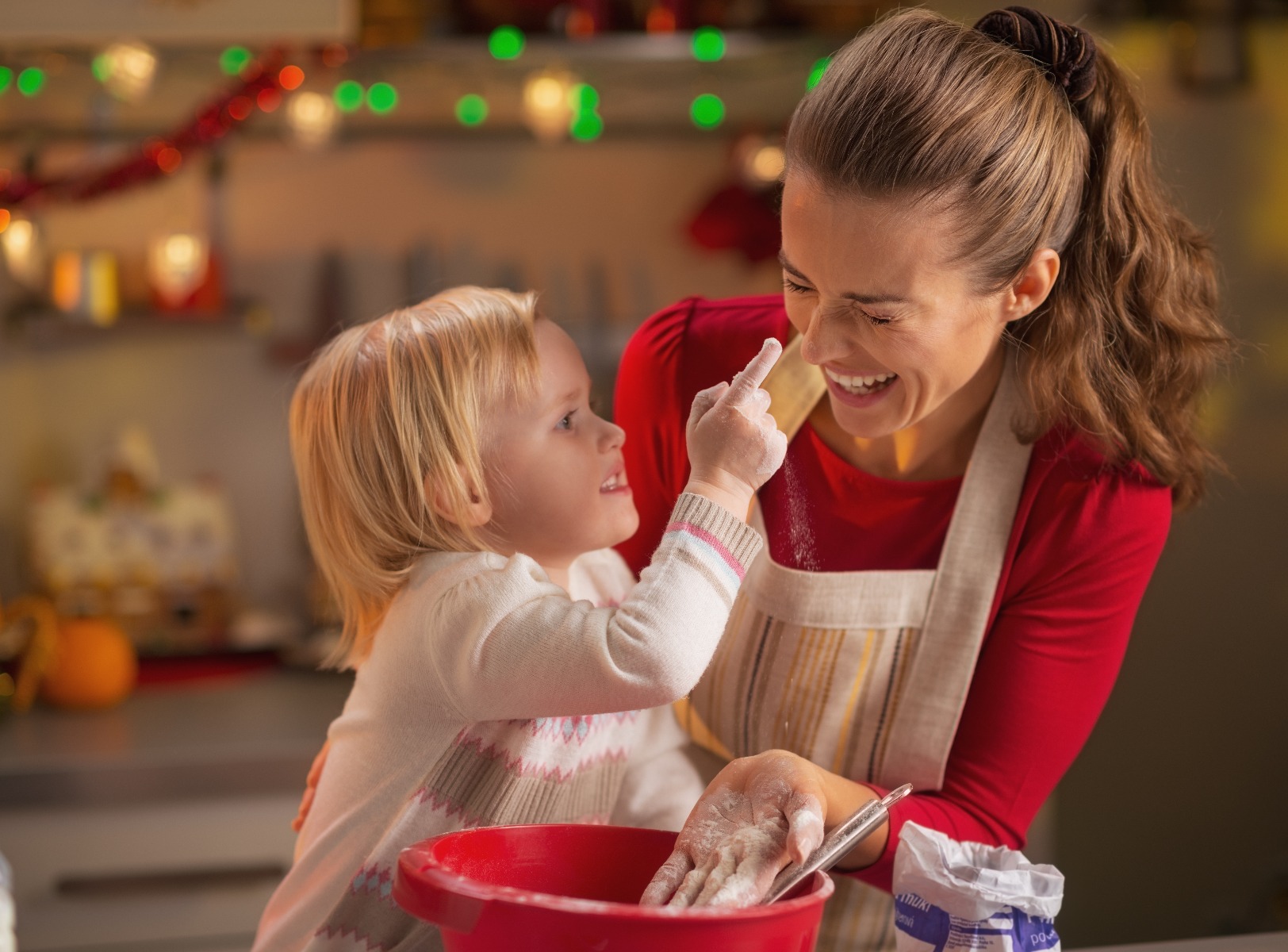
While the holidays can be challenging for children with autism, it can also be difficult for siblings who don’t understand why their brother or sister isn’t excited about Christmas. Make sure to take the time to remind your other children about their sibling’s sensory issues, communication difficulties, and other challenges. Explain how you plan on avoiding potential issues and what you will do if they occur.
Plan time to spend with your other children. Whether it’s as simple as baking cookies while your child with autism is watching something on their iPad, or something more involved, like heading out to a holiday show and getting respite care for your other child.
While it can be difficult to balance the needs of your child with autism with the holiday desires of your other children, it is possible. Rely on friends and family to help out.
Maybe grandma and grandpa can take your other children to see the Nutcracker one day. Then the next weekend, they can watch your child with autism while you take the other kids to a school holiday party. Or maybe your children go ice skating with a friend and their parents, while you stay home and watch a Christmas movie with your other child. With help, you can ensure all of your children have a happy and memorable holiday season.
Christmas Gifts

Purchasing Gifts with Your Child
Shopping at the mall during the holidays can be overwhelming for adults, let alone children with autism. If you plan on taking your child holiday shopping, make a short list of the items you want to purchase to keep the trip brief. Try to go during the week when the crowds aren’t as big. Fidget toys, noise cancelling headphones, and social stories can help your child cope with holiday shopping.
Your child might only be able to handle picking out one gift for someone in your family, and that’s okay. Go shopping for that one item and then head out to avoid overwhelming your child and ending your shopping trip with a meltdown. You can go back and get the rest of the gifts on your list later.
Another option is to shop online. Some children may know what they want to get their siblings, or mom, or dad. For others, you can just show them a few pictures online and let them pick an item. Online shopping helps your child avoid the crowds and means that they can pick gifts slowly over a few days. This is helpful for children who don’t have the attention span or ability to cope with choosing several gifts for different people all at once. Some kids might not be able to choose gifts for others, and that’s okay, too.
Choosing Gifts for Your Child
Give your child what they will enjoy. Whether that’s Thomas the Train, bubble wrap, photos of family members, or other special interests. It doesn’t need to be the latest hot toy of the season, instead consider what your child will love. You may want to offer suggestions to family members who want to buy a gift for your child too.
If you’re looking for gift ideas, check out this list of 35 Gift Ideas for Children with Special Needs. It’s full of plenty of sensory toys and other suggestions that may appeal to your child with autism. Or consider creating a Snoezelen sensory room for your child, here are our suggestions for creating a sensory room on a budget.
Some children aren’t interested in a lot of gifts. That’s okay, too. Consider giving an ‘experience gift’ instead like a trip to an indoor waterpark, or to go see the trains, or visit the zoo.
Wrapping Gifts
Some children don’t have the motor skills and dexterity needed to open gifts wrapped in wrapping paper. Make it easier by placing the gift in a bag and just adding a couple pieces of tissue paper instead.
Others don’t like surprises. Don’t feel like the gifts need to be wrapped; leave them unwrapped or place them in clear gift bags if it will make your child happier.
Make sure the presents are ready to be used. Unwrap them from the packaging, put them together or insert batteries if needed, load computer games, remove tags, and do any other prep work before hand. That way the toy is ready to be used when your child opens it.
Unwrapping Gifts
For some children, Christmas morning can be a sensory overload and cause anxiety. If it’s easier for your child, consider gift giving in advance. Maybe you have a special arrangement with Santa to bring gifts on the 23rd so your child and open and play with the toys before all of the hustle and bustle of Christmas and Christmas Eve.
Or maybe your child would do best if they open one present a day leading up to Christmas. Or maybe they open them on Christmas morning but only open a few at a time before taking a break. There is no right way to do Christmas gifts - it’s all about what works for your child.
If you’re opening gifts on Christmas Day, you can let your child open the most exciting present first so they can play while other family members open their gifts. Or give them a designated task like ‘present distributor’ or ‘wrapping paper collector’ so they have a task they can focus on during the gift opening.
Holiday Travel
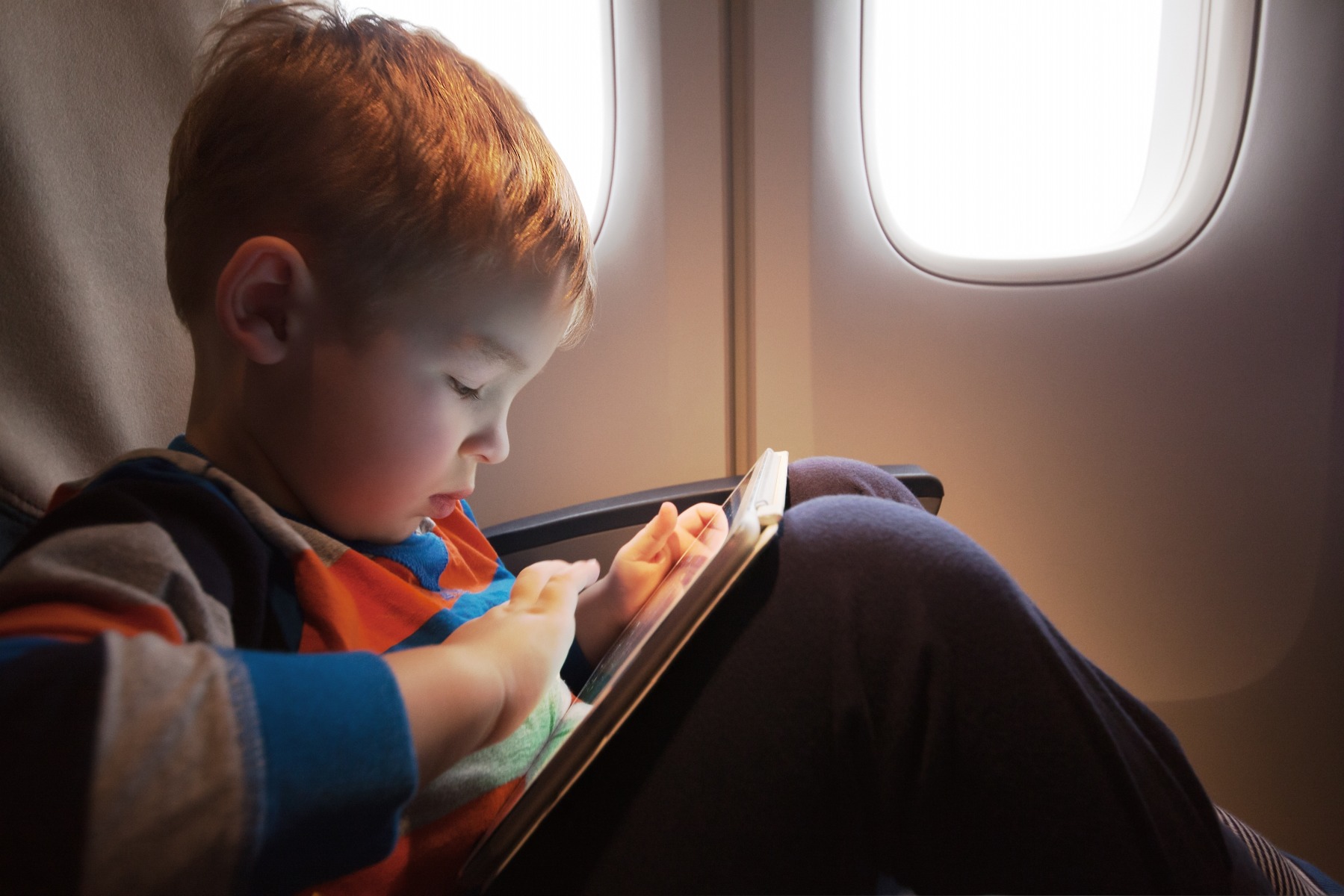
Traveling can be stressful. It’s a disruption to your child’s routine and has elements that you don’t have a lot of control over (delays, layovers, traffic, etc.). The holidays make airports and roads even more crowded and the winter weather doesn’t help. But traveling with a child with autism can be done!
Prepare Your Child
A social story can help your child prepare for a new experience like traveling on a plane. Be sure to explain all of the steps including checking in, going through security, waiting at the gate, boarding, find your seat, taking off, flying, landing, and waiting for luggage. One example is the Taking an Airplane Guide by Autism Speaks and JetBlue. Add information about a layover to the story if your flight has one. And be sure to also explain the possibility of flight delays.
If you’re going on a long car ride, explain that experience too. Will you be stopping for gas? Getting fast food or eating at a restaurant along the way? Spending a night in a hotel to break up the long drive? Help your child prepare for what will happen along the way.
Don’t forget to also prepare your child for where you will be staying when you arrive. Is it a big hotel with elevators and lots of other people and rooms? Or will you be staying with grandma and grandpa at their home or with other relatives? Help your child get ready for the change in their routine ahead of time.
Contact the Airport and Hotel
Contact the airport before your flight to let them know you will be traveling with a child with autism and share any accommodations that you need. Some airports might be willing to allow your child to do a practice run of the security checkpoint ahead of time.
When at the airport, be sure to inform the security officer that your child has autism. Let them know if you have suggestions on how to complete the screening while minimizing confusion and stress for your child.
Depending on your child, some hotels and hotel rooms might be a better choice than others. If your child is a runner, you may want a hotel with an elevator that requires a keycard swipe before pressing the floor button.
Some hotels offer free breakfast in the morning. You can ask about the menu to see if your child will eat something there or if the benefit will not be useful for your family. It’s often noisy during breakfast, so you might want to go down, grab a few plates, and eat back in your room. A hotel room with a kitchenette can be helpful if your child is a picky eater. You can even get groceries delivered to the hotel using a service like Amazon Fresh or Walmart Grocery.
If your child is sensitive to noise, you may want to call ahead and request a room away from elevators, ice machines, and vending machines. A room located away from the pool can also be a good idea for safety if your child might slip out of the room. Additional locks and alarms can be purchased to help secure your hotel doors as well.
Plan Ahead and Pack Essentials
When choosing seats on the plane think about your child’s needs. Will they do best in a more secluded spot by the window, where they can look out? Or is a spot on the aisle best so your child can walk around and has easy access to the bathroom? If you think your child might kick the seat in front of them, are you better off splitting off from your spouse so one parent can sit beside your child and one in front of them?
Pack a bag full of things your child might need while on the plane and on vacation. Fidget toys, a favorite blanket or toy, a tablet, noise cancelling headphones, snacks, food (like a specific brand of boxed mac and cheese to cook at your destination or gluten free options), medication, and other essentials should travel in a carry-on for access during layovers or in case your luggage gets lost.
Packing a blanket or a favorite stuffed animal can make a new hotel environment feel and even smell more like home. To enhance a sense of familiarity, try to stick to the same food and mealtimes, bedtimes, and bedtime rituals as at home. While it can be harder to do on special days like Christmas Eve and Christmas Day, sticking to this schedule for most of your trip can help bring a sense of comfort to your child.
And try to plan some quiet downtime in your schedule as well. Whether it’s for napping at the hotel or resting at a quiet room at their grandparents’ house, the break allows your child to escape from the stimulation overload of the holidays.
Visiting Relatives

Many people visit family over the holidays or have relatives over to their house. While it’s fun to reunite and celebrate together, the additional people can bring a lot of noise and changes in routine. When you have aunts and uncles, cousins, and friends around who don’t typically spend as much time with your child, it can be helpful to prepare both them and your child prior to the visit.
Preparing Your Child
When visiting relatives, talk to your child in advance. Let them know when you will go there, where you are going, who will be there, what you will do while there, and when you will leave. Talk to the host about designating one room as the ‘quiet room’ where your child can go for a break, if they need space and time away from the festivities. Be sure to show your child where the room is when you enter the house. If you are hosting the holidays this season, be sure to share the same information with your child to prepare them for your visitors.
Preparing Your Relatives
If you will be visiting family that you do not see as often or going to a holiday party at a friend’s house, consider emailing, texting, or calling them ahead of time. You can explain autism, give must-know information (like he doesn’t like hugs, she won’t look you in the eye, but she’s listening), and explain what to do if your child has a meltdown (give us space, quiet everyone down, etc.). If your child is on a special diet or only likes certain foods, you can let the host know so they can have the food on hand (if they want to provide it), or let them know you will bring food and snacks for your child.
Your letter might look something like this.
|
Dear Friends and Family, We are all very excited to visit you this holiday season. As you know, Leo has autism. This means that some aspects of the holiday can be overwhelming. Here’s some information to help make our visit more successful. Leo finds large crowds, loud noises, and lots of decorations to be stressful. We will be bringing noise cancelling headphones to help block the noise and ease his discomfort. Having one room without decorations, in a quieter area of the house available would be helpful. This will let Leo retreat and recharge if the celebrating and sensory overload becomes too much to handle. Also, Leo is does not enjoy hugs. They are uncomfortable for him, but he will wave at you instead and enjoys when you wave back. If he doesn’t make eye contact while talking, Leo isn’t being rude. It’s just challenging and uncomfortable for him. Leo only eats certain foods, since his sensory system is impaired. We will bring snacks and his dinner with us. He might not be able to sit for the whole meal. Don’t hold up the meal if he needs to get up, we will handle the situation. Leo also has some stimming behavior, (humming, rocking, and other behaviors). These behaviors help him calm down and feel more comfortable. If the party becomes too overwhelming for him and he has a meltdown, please let us handle it and intervene only if we specifically ask for help. Please feel free to call me at XXX.XXX.XXXX if you have any questions. We look forward to enjoying the holidays with you, Joe, Annie, Amy, and Leo |
If your friends and family are coming to you, a similar letter or a phone call can still be helpful. Let them know that unexpected visits can be stressful and request that they let you know when they are planning to come by ahead of time.
Helping Your Child Cope
Consider creating a ‘Holiday Happiness Kit’ that you can bring along to holiday activities, parties, and events. Add useful things that your child needs to calm down and self-regulate. It might include your child’s favorite foods, a chew toy, a fidget toy, a weighted blanket, noise cancelling headphones, a pressure vest, a favorite toy, pictures of loved ones or favorite characters, or anything else that will help your child cope with being in a new place and a different environment.
Tips for Christmas Eve and Christmas Morning
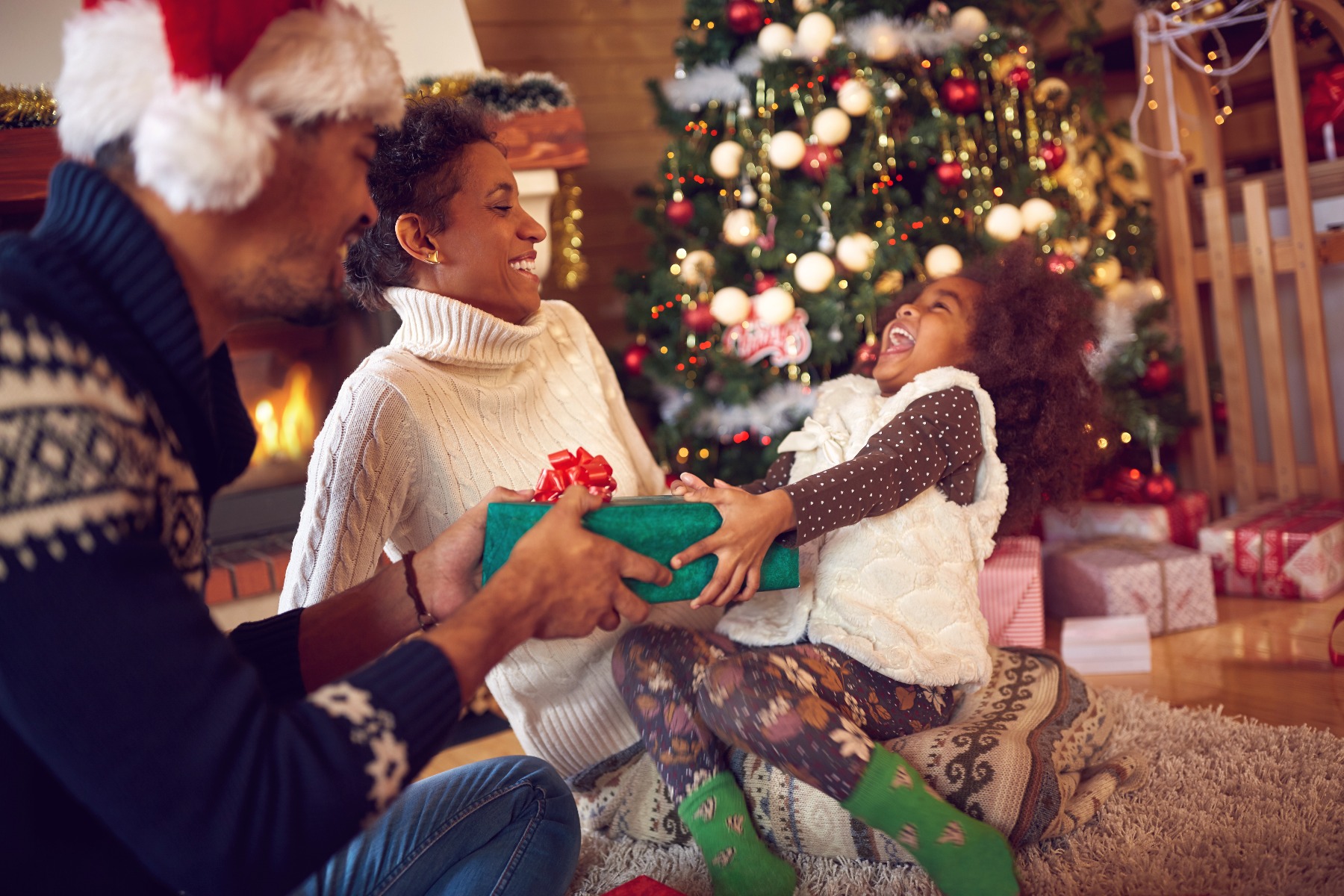
Mealtime
For some families having sandwiches makes more sense than a long Christmas dinner - that’s okay. Or maybe you have a Christmas ham, mashed potatoes, asparagus, stuffing, buttered rolls, and chicken nuggets with ketchup. With all of the changes that Christmas brings, now isn’t usually the best time to introduce new foods. If your child prefers chicken nuggets to a full Christmas meal, make the nuggets (it is Christmas after all).
And keep in mind your child’s typical behavior. If they usually get up during meals, don’t insist that they sit for the whole meal at Christmas.
Opening Presents
Waiting to open presents can sometimes create stress and anxiety. Consider allowing your child to open some on Christmas Eve and some on Christmas Day. This also helps overcome present fatigue, where your child loses interest in opening gifts.
Decide ahead of time what will happen on Christmas morning. Can your child go and look at the gifts under the tree? Can they wake you up right away? Do they need to stay in their room until a certain time? Let your child know what to expect ahead of time. If your child needs to wait and stay in their room, consider hanging their stocking on their door so they can open it while they wait.
Discuss what will occur during present opening too. Will someone pass out presents or will everyone get their own? Will everyone open their gifts at the same time or take turns? Will the presents be ready to play with or require assembly? If you can put the gift together ahead of time, it can decrease your child’s frustration and let them get straight to playing.
Looking Toward the Future

It’s important to remember to celebrate the small victories throughout the holidays. Your child opening a present for the first time, or saying ‘Merry Christmas’, or hugging grandma, or being able to sit through their first church service.
Over time, your child may begin to become a more passionate holiday celebrator. With multiple holiday seasons comes a routine that many children with autism thrive on. The structure of traditions may appeal to your child and mean that they begin to enjoy your version of Christmas, whatever that may look like.
Hopefully with these tips, your family’s Christmas is merry and bright!
Medical Disclaimer: The information provided on this site, including text, graphics, images and other material, are for informational purposes only and are not intended to substitute for professional medical advice, diagnosis or treatment. Always seek the advice of your physician or other healthcare professional with any questions or concerns you may have regarding your condition.








 France
France Australia
Australia






